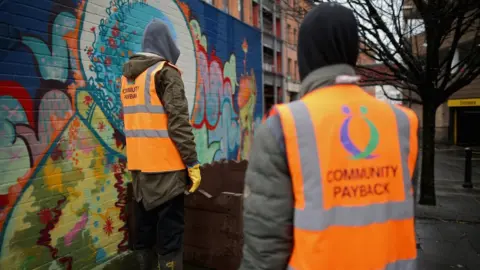Private firms to lose role in probation services
 Getty Images
Getty ImagesThe government has scrapped plans to let private firms run behaviour programmes and unpaid work schemes for offenders in England and Wales.
Justice Secretary Robert Buckland said the "disruption" caused by coronavirus had led ministers to "reassess" their involvement.
He added that renationalising the services would give ministers "greater flexibility" during the crisis.
Labour said involving private firms was a "mistake" and welcomed the "u-turn".
The firms, known as community rehabilitation companies (CRCs), will no longer be able to bid for the contracts - worth £1.3bn over eight years - from June next year.
Responsibility will be transferred to the state-run National Probation Service, which currently supervises high-risk released prisoners and those serving community sentences in England.
The NPS was already due to take back supervision of low and medium-risk offenders from private firms from December, under a shake-up outlined by ministers in May last year.
Under the changes, private firms and voluntary organisations will still be able to bid to run specialist services such as employment, training and addiction support.
Announcing the plan in the Commons, Mr Buckland said they had shown "great innovation" in delivering services and he wanted to "preserve a role" for them.
But he added bringing unpaid work and behavioural change schemes back in-house would give the government "greater flexibility to respond to an uncertain picture".
"It is vital for public and judicial confidence that we have the flexibility to deliver a national response to any future challenges that Covid-19 presents," he added.

- SYMPTOMS: What are they and how to guard against them?
- 40,000 DEATHS: Could they have been prevented?
- FACE MASKS: When should you wear one?
- TESTING: Who can get a test and how?

Shadow justice secretary David Lammy welcomed the changes, calling them a "u-turn that we have been calling for, for many, many years".
He told MPs the decision to involve private firms had been an attempt to "cut corners" that had "cost so much more in the long run".
He called on the government to apologise for the "mistake" of part-privatising the probation system in 2014 under then Justice Secretary Chris Grayling.
He added: "Profit was put before public safety, ethics were compromised and lives were lost."
"The government wants to frame these reforms as purely down to the coronavirus, but we all know the truth - the problems are much deeper than that".
"Let this momentous u-turn be the end of the assumption that the private sector always knows best".
'No magic bullet'
Chief Inspector of Probation Justin Russell said curtailing the involvement of private firms in probation services was "likely to be welcomed by many".
He said part-privatisation had "severely tested" the probation service, with CRCs denied "essential funding" because of "fundamental flaws" in their contracts, including a payment-by-results model.
However he cautioned that "shifting large volumes of cases" back under state control was "not a magic bullet for improving performance by itself".
"The probation service must be properly funded," he said.
"Vacancies for probation officers must be filled, and staff properly trained for their new responsibilities."
Leaked report
The announcement comes as an internal report suggests some high-risk offenders in England and Wales may not have been monitored as closely as they should have been during the lockdown.
The internal Ministry of Justice document shows probation staff did not carry out all the planned checks in half of cases, in one four-week period.
The NPS has scaled back face-to-face supervision of thousands of sex offenders and violent criminals, to prevent infection during the coronavirus epidemic.
However, the NPS disputed the significance of the figures, with a spokesperson saying: "This data is partial, experimental and unreliable.
"We don't use it in isolation to judge performance and the public shouldn't do either.
"All our wider evidence in combination shows offenders are receiving the right levels and types of supervision."
